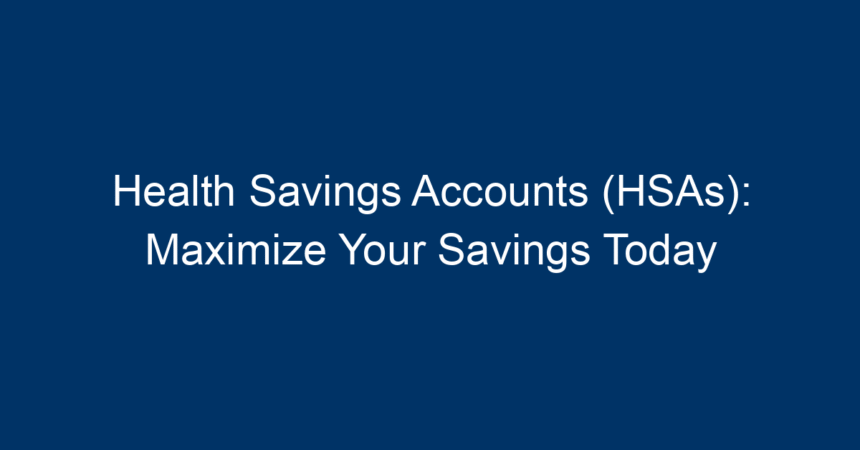In today’s fast-paced healthcare environment, managing medical expenses can be daunting. Health savings accounts (HSAs) provide a smart financial solution that can help you save for future healthcare costs while enjoying tax benefits. Whether you’re looking to lower your out-of-pocket medical expenses or safeguard your finances against unexpected emergencies, understanding and utilizing HSAs is crucial. In this article, we’ll delve into what HSAs are, how they work, their benefits, and tips on how to maximize your savings today.
What Are Health Savings Accounts (HSAs)?
Health savings accounts (HSAs) are specialized savings accounts designed to help individuals save money for medical expenses. Funded with pre-tax dollars, HSAs allow you to pay for eligible healthcare costs while enjoying significant tax advantages.
To qualify for an HSA, you must have a high-deductible health plan (HDHP), which typically features lower monthly premiums but higher deductibles. As of 2023, to qualify as an HDHP, your plan must have a minimum deductible of $1,500 for individual coverage and $3,000 for family coverage.
Key Features of Health Savings Accounts (HSAs)
1. Tax Benefits
One of the most appealing aspects of HSAs is their triple tax advantage:
- Contributions are tax-deductible: Money deposited into an HSA reduces your taxable income for the year.
- Tax-free withdrawals: When you use the money for qualified medical expenses, there are no tax implications.
- Tax-free growth: Any interest or investment earnings on the account’s balance grow tax-free.
2. Roll Over Unused Funds
Unlike Flexible Spending Accounts (FSAs), which operate on a “use it or lose it” basis, Health Savings Accounts (HSAs) allow you to roll over unused funds year after year. This means your savings can accumulate and grow, giving you a valuable resource for future healthcare needs.
3. Investment Opportunities
Once your HSA balance reaches a certain threshold (which varies by the provider), you can invest the excess funds in stocks, bonds, or mutual funds. This feature can significantly enhance your savings over time, especially if you begin contributions early and allow the investment to grow.
Why Should You Have a Health Savings Account (HSA)?
Managing Rising Healthcare Costs
With healthcare costs on the rise, health savings accounts (HSAs) offer a proactive way to manage expenses. By contributing consistently, you can create a safety net for unplanned medical events. Having a dedicated fund ensures you can cover anything from routine check-ups to emergencies without financial stress.
Retirement Benefits
HSAs aren’t just for medical expenses during your working years. Once you reach age 65, any withdrawals for non-medical expenses are taxed at your regular income tax rate, just like traditional retirement accounts. However, if you use the funds for qualified medical expenses at that time, the withdrawals remain tax-free. This makes HSAs a versatile financial tool for retirement planning.
Qualifying for HSAs
To fully capitalize on health savings accounts (HSAs), ensure that you meet the eligibility criteria before opening one. It’s essential to have a qualified high-deductible health plan. Investigate various HDHP options to find one that offers comprehensive coverage while still enabling you to benefit from an HSA.
Steps to Maximize Your Health Savings Account (HSA)
1. Contribute the Maximum Allowable Amount
For 2023, individuals can contribute up to $3,850, while families can contribute up to $7,750. If you are 55 or older, you can add an extra $1,000 as a catch-up contribution. Maxing out these contributions allows you to enjoy the full tax benefits and grow your savings considerably.
2. Keep Your Receipts
Maintain thorough records of all medical expenses. This documentation will ensure you can withdraw funds later, tax-free, for any qualifying costs. Keeping your receipts organized can help reduce ambiguity if ever audited.
3. Invest Wisely
If your HSA allows investments, take Full advantage of this feature. Research and choose funds that align with your risk tolerance and financial goals. A well-managed investment strategy can significantly increase your account balance over the years.
4. Use Your HSA as a Long-Term Savings Tool
Many HSA holders use funds to cover immediate medical expenses, but a smarter strategy is to let your savings grow. Consider paying for routine medical expenses out-of-pocket and allowing your HSA to accumulate. This way, you can maximize interest or investment growth.
5. Stay Informed on Changes in Tax Laws
Tax laws and contribution limits can change from year to year. Stay up-to-date on current regulations and adjust your contributions accordingly. Checking the IRS website or consulting a tax professional may be beneficial.
6. Utilize Your HSA for Retiree Medical Expenses
As you approach retirement, anticipate future medical expenses. Use your HSA to pay for Medicare premiums, long-term care premiums, and other unreimbursed medical expenses, providing you with much-needed financial relief.
Common Misconceptions About Health Savings Accounts (HSAs)
HSAs Are Just for Young, Healthy People
While younger individuals may see fewer immediate medical expenses, HSAs are beneficial for everyone. An HSA provides a financial cushion for unpredictable health events that can happen at any age.
HSAs Are Complicated
Although HSAs can seem complicated, they are relatively easy to set up and manage. Many banks and financial institutions offer user-friendly online platforms that simplify account management.
You Can Only Use HSAs for Medical Expenses
While HSAs are primarily intended for medical expenses, funds can also be withdrawn for non-medical reasons after age 65 without incurring a penalty—just the standard income tax applies.
Conclusion: Take Action Today
Health savings accounts (HSAs) are an exceptional financial tool that can help mitigate healthcare costs both now and in the future. By taking advantage of their tax benefits, rolling over unused funds, and investing wisely, you can optimize your savings effectively.
Actionable Insights:
- Research and select a high-deductible health plan that qualifies for an HSA.
- Contribute the maximum allowable amount to your HSA as soon as possible.
- Utilize online resources to track and organize your medical expenses.
- Educate yourself about investment options within your HSA to enhance growth.
By strategically managing your health savings accounts (HSAs), you embrace financial empowerment and safeguard your health, allowing for a stress-free future. Start maximizing your savings today!




